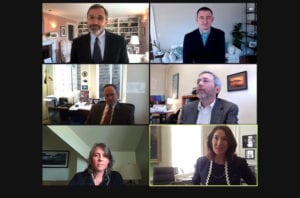Who is a member?
Our members are the local governments of Massachusetts and their elected and appointed leadership.

State and local leaders convened on Zoom to discuss the vaccine rollout and updates on federal aid. Pictured are (top row, l-r) MMA Executive Director Geoff Beckwith; Heath Fahle, special director for federal funds at the Executive Office of Administration and Finance; (middle row, l-r) Sean Cronin, senior deputy commissioner at the Division of Local Services; Dr. Larry Madoff, medical director at the Department of Public Health; (bottom row) Jana Ferguson, assistant commissioner at the Department of Public Health and Lt. Gov. Karyn Polito.
State and local leaders today discussed federal aid programs and the ongoing COVID-19 vaccine effort — as well as some hopefulness about summer activities — during their regular conference call convened by the MMA. At a turning point of the pandemic, “more to come” was a common refrain, but the good news appears not that far off.
State and local officials alike eagerly await guidance from the U.S. Treasury Department about final allocation amounts from the American Rescue Plan Act, as well as how the funds can be used and the reporting requirements. Heath Fahle, special director for federal funds at the Executive Office for Administration and Finance, said there’s been no official word from the Treasury about timing — it could be next week, or as much as four weeks away.
Fahle said his office is “still unpacking” the American Rescue Plan, but reminded local officials that the $1.9 trillion package contains a lot more than the $130 billion going directly to municipal and county governments — some $3.4 billion of which will land in Massachusetts. The non-local aid programs include a restaurant revitalization program, a shuttered venue operators grant, a range of economic development and business assistance programs, and additional funding for rental, mortgage and child care assistance.
“There are going to be lots of federal grant opportunities that are going to be available,” he said.
In the meantime, the Federal Emergency Management Agency issued guidance yesterday about new eligible uses under the FEMA Public Assistance program, which President Joe Biden expanded in January. The program will now reimburse for items such as PPE for non-first responders and cleaning and sanitation, from Jan. 21, 2021, through Sept. 30 of this year. The president’s action also increased the program’s reimbursement rate from 75% to 100%, retroactive to the beginning of the emergency in January 2020. Fahle said his office is currently reviewing the new guidance and will develop guidance about the relationship between the FEMA Public Assistance program and the Coronavirus Relief Fund. He advised local leaders to consult their Massachusetts Emergency Management Agency representative with any questions.
Fahle said FEMA is prioritizing reimbursement for vaccine-related costs, including new hires if they become necessary. He said communities are likely to be able to seek reimbursement for the costs of coordination and compliance related to federal aid programs, even if it requires creating a new in-house or contract position.
Polito reported that 1.5 million residents are now fully vaccinated and COVID hospitalization rates are declining. She said Massachusetts continues to lead the 24 states with populations over 5 million in the number of doses administered per capita. She added that COVID hospitalization rates are 50% higher in states such as Connecticut, Pennsylvania and Minnesota.
The state received 383,000 doses last week, and the federal government supplied another 150,000 doses directly to pharmacies and health centers.
She said the state allotment includes 10,000 doses of the Johnson & Johnson vaccine that are being set aside for the Homebound Vaccination Program that officially launched a week ago. The single-dose vaccine is being prioritized for those who cannot leave their homes, eliminating the need for a second shot.
Last month, 165 municipalities informed the Department of Public Health that they intended to run their own vaccination program for homebound residents, while 186 opted to work with state-selected vendors.
The DPH is operating a toll-free number (833-983-0485) Monday through Friday, 9 a.m.-5 p.m., in multiple languages to help determine eligibility and schedule appointments. More than 9,000 calls have been received so far, according to Jana Ferguson, assistant commissioner at the DPH, about two-thirds of whom are deemed eligible for the program.
The DPH provides vaccines directly to municipalities that are running the local program themselves, Ferguson said.
“We’re dedicating a lot of funds and a lot of doses to make sure this program works the way it is intended,” Polito said.
As COVID vaccination numbers rise, local officials also sought guidance on reopening senior centers, beaches and Fourth of July events. On the latter two, Lt. Gov. Karyn Polito said state officials will provide updates soon.
With regard to senior centers, she said councils on aging should consult their local health departments, as well as Guidance for People Who Are Fully Vaccinated Against COVID-19 and Safety Standards for Indoor and Outdoor Events, which covers issues including capacity and gathering limits. She added that her office will consult with the Executive Office of Elder Affairs to see if more guidance could be made available.
“They can open, but I think the question is, how are we going to do this?,” Polito said. “What are the strategies and the best practices?”
Polito gave updates on the Mass Growth Capital grant program — nearly $650 million delivered to almost 15,000 businesses across the state — and the Rapid Recovery Plan Program, which is providing technical assistance to 125 communities. She said state officials are working on smaller grant programs for regional recovery and the tourism industry, with details expected soon.
The conference call was the 34th in a series that began in March 2020.
• Audio of April 6 call with administration (35M MP3)